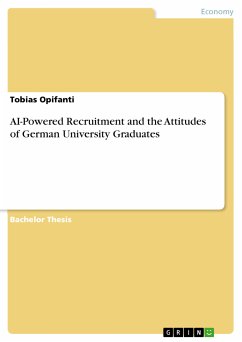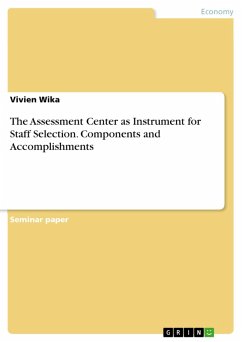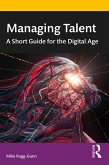Bachelor Thesis from the year 2020 in the subject Leadership and Human Resource Management - Recruiting, grade: 1,2, European School of Business Reutlingen, language: English, abstract: Abstract: Businesses are becoming increasingly reliant on technology as globalization progresses. New skills and knowledge are vital for organizations to be competitive, making Human Resource Management (HRM) more important now than ever. The application of advanced technology like Artificial Intelligence (AI) has gained significant attention in the recruitment process in recent years. AI offers promising solutions for recruiters to increase cost and efficiency by taking over repetitive tasks, such as screening CVs and conducting job interviews. However, little is known so far about how these solutions affect potential applicants' attitudes, particularly the attitudes of graduate students from German universi-ties, and whether they are willing to accept and make use of the new opportunities offered by AI. Therefore, the purpose of this thesis is to investigate German graduate students' attitudes towards AI-powered recruitment. Toward this end, data were collected through a questionnaire that was emailed to German university (graduate) students. The results indicate that the type of AI is a crucial factor. Furthermore, factors such as attitude towards technology in general, attitude towards AI, potential demonstration, impartiality, feedback, and concern are significantly related to the participants' attitudes. Amongst these factors, impartiality appears to be the strongest predictor. It can be concluded that employers must pay considerable attention to their AI-powered recruitment tools if they wish to attract the right job candidates in the future. ... Data Analysis: The online questionnaire gathered data from a total of 456 different respondents. Howev-er, 50 respondents dropped out before completion and a further 36 respondents were not in line with the inclusion criteria. These respondents needed to be excluded from the sample, which resulted in a final sample size of n=370 individuals. As presented in Table 2, the sample consists of more female (54.59%) than male respond-ents (45.41%). The average age of participants is 23.06 years, which is slightly below the average age of 23.40 years for German university-level institution students (Destatis, 2020). The sample includes participants who are studying or have studied business scienc-es (56.14%), engineering (27.84%), and other study programmes (7.03%). ... ...
Dieser Download kann aus rechtlichen Gründen nur mit Rechnungsadresse in A, B, BG, CY, CZ, D, DK, EW, E, FIN, F, GR, HR, H, IRL, I, LT, L, LR, M, NL, PL, P, R, S, SLO, SK ausgeliefert werden.









